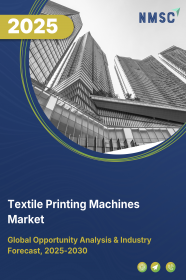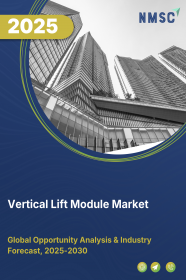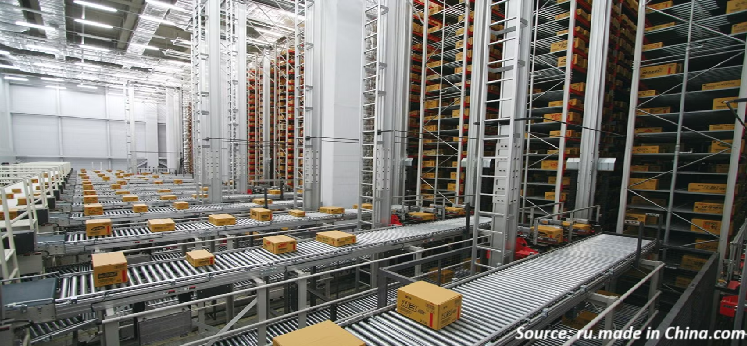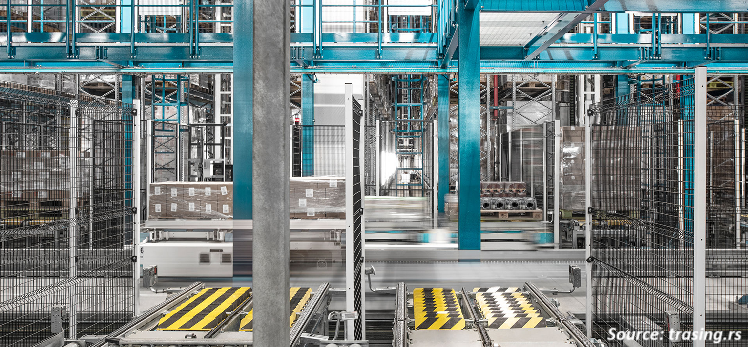
Textile Printing Machines Market by Printing Type (Rotary Screen Printing , Flat Screen Printing, Digital Printing and Heat Transfer Printing), by Ink Type (Sublimation, Pigment, Reactive, and Acid), by Substrate (Natural Fibers, Synthetic Fibers, Blended Fabrics, Non-Woven Fabrics, Technical & Functional Textiles), by Operation (Single Pass and Multi Pass), by Application (Home Textiles, Clothing and Apparel, Soft Signage, and Others)– Global Opportunity Analysis and Industry Forecast 2025–2030
US Tariff Impact on Textile Printing Machines Market
Trump Tariffs Are Reshaping Global Business
Textile Printing Machines Market Overview
The global Textile Printing Machines Market size was valued at USD XXX billion in 2024 and is predicted to reach USD XXX billion by 2030 with a CAGR of YY% from 2025-2030.
The advanced technologies, world sustainability, fashion industry are driving the market. The lack of high investment required to buy a digital textile printing machine, ink, software, and infrastructure restrains the usage of these machines, thus inhibiting market growth. Additionally, leaders such as Mimaki Engineering, Roland DGA Corporation, Konica Minolta are launching different measures including creating pioneering digital printing products, investing in R&D activities to create superior performing printing solutions, strengthening international distribution channels and making sustainability even better through greener inks and energy-conserving printing technology. The incorporation of new technologies including direct-to-garment (DTG) and direct-to-fabric (DTF) in textile printing machine market provides opportunities for the market.
Technological Advancements Driving Textile Printing Machines Market Growth
The integration of advance technologies drives the growth of fabric printing technology industry by enabling faster production and greater precision, cost-efficient, small-batch printing directly addressing increasing demand for custom and intricate designs. In October 2023 introduction of Ricoh's direct-to-garment printing technology, DTG Ri 1000X, designed to be a high-performance printer setting a new standard in apparel decoration and customization, reflecting the commitment of the company to innovation and excellence in the industry.
The Global Shift Towards Sustainability Driving the Textile Printing Machines Market Demand
The global shift towards sustainability driving the demand of textile printing machine market due to use of environmentally friendly inks, substrates and process to reduce waste and energy consumption. For instance, in March 2024, Kyocera corporation launched its inkjet textile printer FOREARTH in the industry tool category. It eliminates virtually all water usage from the textile printing process, also reduce energy consumption and CO2 emissions during printing process as it does not require large-scale equipment traditionally used for pre and post treatment of textiles.
The Fashion Industry is Driving Growth of the Textile Printing Machines Market Trends
The fashion industry is driving growth of the market due to changing consumer preferences and global shift towards branded apparel. Uniform Market report states that in December 2024, the global apparel market achieved value USD 1.79 trillion and represents 1.6% of the world's GDP. This development in the apparel sector ramps up the need for higher textile printing machine to support the changing demands of the consumer.
High Cost Hinders the Market Growth
High cost associated with purchasing a digital textile printing machine, ink, software, and infrastructure limits the adoption of these machines, thereby hindering market expansion.
Integration of direct-to-garment (DTG) and direct-to-fabric (DTF) Creates Opportunities
Integration of emerging technologies such as direct-to-garment (DTG) and direct-to-fabric (DTF) in textile printing machine market creates opportunities for the market. These technologies offer high-quality designs with precise designs and faster turnaround times with minimal waste.
Market Segmentation and Scope of The Study
Textile printing machines market report is divided on the basis of printing type, ink type, substrate, operation, application, and region. On the basis of printing type, the market is divided into rotary screen printing, flat screen printing, digital printing, and heat transfer printing. On the basis of ink type, the market is divided into sublimation, pigment, reactive and acid. On the basis of substrate, the market is divided into natural fibers, synthetic fibers, blended fabrics, non-woven fabrics, technical & functional textiles. On the basis of operation, the market is divided single pass and multi pass. On the basis of application, the market is divided into home textiles, clothing and apparel, soft signage, and others. Regional breakdown and analysis of each of the aforesaid segments includes regions comprising of North America, Europe, Asia-Pacific, and RoW.
Geographical Analysis
The Asia-Pacific region dominates the textile printing machine market share. Digital textile printing technology is changing the market by increasing speed, precision, and sustainability. Modern machines such as single-pass and hybrid printers allow fast and high-quality printing on different fabrics with less waste. In July 2024, Hanglory Group in China launched the Rocket Hybrid, a new machine for efficient and sustainable textile production. This advanced technology enhances efficiency and supports the growing demand for versatile and sustainable textile production.
Additionally, the emerging home textile market encourages the demand for textile printing machines through the demand for high-quality and bulk-printed fabrics. With home consumers demanding customized and attractive interior decorations, manufacturers increasingly apply advanced printing technology to print ornate patterns onto bed linens, curtains, furniture covers, and carpets. As per Ministry of Commerce, India's home textiles sector reached to USD 10.78 billion in 2023, fueled by rising demand for home furnishings. This expansion is drives demand for textile printers for effective printing options.
On the other hand, North America is the fastest growing region in textile printing machine market. This growth drives by the increasing demand for customization in industries such as fashion, apparel and thereby consumer preferences for personalized and sustainable textile solutions further drives the growth of the market in North America. According to Department of Commerce, The Canadian apparel market is projected to grow at a compound annual growth rate of 3.29% from 2022 to 2026, driven by the influence of major fashion hubs such as Toronto, Vancouver and Montreal, these cities further boosting the Canadia fashion market.
Moreover, the shift towards sustainability driving the demand of textile printing machine market due to use of environmentally friendly inks, substrates and process to reduce waste and energy consumption. For example, in January 2023, Vera Inkjet launched a new product line specifically designed for roll-to-roll (R2R) digital textile printing uses. The line features innovative ink formulations that are meant to improve print quality are specifically designed for high-performance output on different textile substrates, enabling sustainable and efficient production.
Competitive Landscape
Various players in the textile printing machines industry includes Kornit Digital, Seiko Epson Corporation, Mimaki Engineering, Roland DG Corporation, Durst Group, Konica Minolta, Ricoh, Colorjet, Sawgrass Technologies Inc, Spgpringts B. V., Atexco, Aeoon Technologies GmbH, Brother Industries, Agfa Graphics, Hollanders Printing Solution. These market players are opting strategies including product launches to maintain their dominance in the market.
For instance, Mimaki Engineering launched in May 2023, cartridges that are made from paper instead of plastic and are designed to be used in Mimaki's eco-solvent printers. They are estimated to reduce plastic usage by 68% per cartridge and CO2 emissions by 65 tons per year.
Moreover, Roland DGA Corporation in January of 2025 introduced the Roland DG TY-300 in North America. This new direct-to-film (DTF) printer is poised to provide top-quality image prints, high-speed production, and low cost of ownership. The TY-300 offers bright, crisp transfer graphics for customizing apparel at printing speeds up to four times as fast as comparative models, substantially lowering operating costs.
Key Benefits
-
The report provides quantitative analysis and estimations of the textile printing machines market from 2025 to 2030, which assists in identifying the prevailing market opportunities.
-
The study comprises a deep-dive analysis of textile printing machines report including the current and future trends to depict prevalent investment pockets in the market.
-
Information related to key drivers, restraints, and opportunities and their impact on the textile printing machines industry is provided in the report.
-
Competitive analysis of the players, along with their market share is provided in the report.
-
SWOT analysis and Porters Five Forces model is elaborated in the study.
-
Value chain analysis in the market study provides a clear picture of roles of stakeholders.
Textile Printing Machines Market Key Segments
By Printing Type
-
Rotary Screen Printing
-
Flat Screen Printing
-
Digital Printing
-
Heat Transfer Printing
By Ink Type
-
Sublimation
-
Pigment
-
Reactive
-
Acid
By Substrate
-
Natural Fibers
-
Synthetic Fibers
-
Blended Fabrics
-
Non-Woven Fabrics
-
Technical & Functional Textiles
By Operation
-
Single Pass
-
Multi Pass
By Application
-
Home Textiles
-
Clothing and Apparel
-
Soft Signage
-
Others
By Region
-
North America
-
The U.S.
-
Canada
-
Mexico
-
-
Europe
-
The UK
-
Germany
-
France
-
Italy
-
Spain
-
Denmark
-
Netherlands
-
Finland
-
Sweden
-
Norway
-
Russia
-
Rest of Europe
-
-
Asia-Pacific
-
China
-
Japan
-
India
-
South Korea
-
Australia
-
Indonesia
-
Singapore
-
Taiwan
-
Thailand
-
Rest of Asia-Pacific
-
-
RoW
-
Latin America
-
Middle East
-
Africa
-
Key Players
-
Kornit Digital
-
Seiko Epson Corporation
-
Mimaki Engineering
-
Roland DG Corporation
-
Durst Group
-
Konica Minolta
-
Ricoh
-
Colorjet
-
Sawgrass Technologies Inc
-
Spgpringts B. V.
-
Atexco
-
Aeoon Technologies GmbH
-
Brother Industries
-
Agfa Graphics
-
Hollanders Printing Solution
REPORT SCOPE AND SEGMENTATION:
|
Parameters |
Details |
|
Market Size in 2024 |
USD XX Billion |
|
Revenue Forecast in 2030 |
USD XX Billion |
|
Growth Rate |
CAGR of YY% from 2025 to 2030 |
|
Analysis Period |
2024–2030 |
|
Base Year Considered |
2024 |
|
Forecast Period |
2025–2030 |
|
Market Size Estimation |
Billion (USD) |
|
Growth Factors |
|
|
Countries Covered |
28 |
|
Companies Profiled |
15 |
|
Market Share |
Available for 10 companies |
|
Customization Scope |
Free customization (equivalent to up to 80 working hours of analysts) after purchase. Addition or alteration to country, regional, and segment scope. |
|
Pricing and Purchase Options |
Avail customized purchase options to meet your exact research needs. |

















 Speak to Our Analyst
Speak to Our Analyst





















